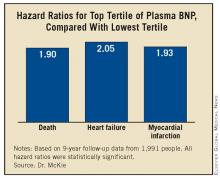STOCKHOLM – High plasma levels of B-type natriuretic peptide linked with a significantly increased risk for heart failure, myocardial infarction, and death during 9 years of follow-up in a group of nearly 2,000 adults from the general U.S. population.
Plasma levels of B-type natriuretic peptide (BNP) “had predictive utility for death, heart failure, and MI, even when adjusted for risk factors and structural abnormalities” of the heart in the general population, Dr. Paul M. McKie said at the annual Congress of the European Society of Cardiology.
“We’re actively working on trying to narrow down the at-risk population” who are possible candidates for routine BNP screening, said Dr. McKie, a cardiologist at the Mayo Clinic in Rochester, Minn. “We’re planning a proof-of-concept intervention trial to see if we can intervene with aggressive risk factor reduction and improve outcomes in people with high BNP levels.” People who may get the most benefit from BNP screening and intervention are those with some level of underlying cardiac risk but no current heart failure, he added.
Results from another analysis recently reported by Dr. McKie and his associates at Mayo showed that relatively high BNP levels could not predict the long-term risk of death or cardiovascular events in people from the general adult population without symptomatic heart failure, elevated plasma creatinine, clinical cardiovascular risk factors (such as hypertension, diabetes, peripheral vascular disease, or MI), or cardiac abnormalities identified by echocardiography (such as left atrial enlargement, wall-motion abnormalities, and valvular dysfunction) (J. Am. Coll. Cardiol. 2010;55:2140-7).
That finding, coupled with the new report, suggests that high BNP is prognostic in the people without heart failure or elevated creatinine but with one or more risk factors or a cardiac structural abnormality, which was found in a majority of the general population studied. Among 2,042 unselected people aged 45 years or older residing in Olmsted County, Minn., and participating in the Rochester Epidemiology Project, 1,288 (63%) had one or more clinical risk factors or an echocardiographic abnormality.
The new analysis began with the 2,042 Olmsted County residents and excluded 45 who had symptomatic heart failure, and 6 with a plasma creatinine of more than 2.0 mg/dL. The researchers measured plasma levels of BNP (specifically amino-terminal pro-BNP) with an immunoassay. These healthy, normal subjects from the community without symptomatic heart failure or elevated creatinine had BNP levels well below the levels found in patients with heart failure, Dr. McKie said.
The analysis examined the risk for death, incident heart failure, or incident MI during an average 9 years of follow-up. People in the highest BNP tertile consistently had double the rates of all three outcomes during follow-up than did people in the lowest tertile after adjustment for age, sex, body mass index, clinical risk factors, or echocardiographic abnormalities, differences that were statistically significant. The analysis also showed that the link between high BNP levels and adverse outcomes remained significant after adjustment for plasma levels of atrial natriuretic peptide. “BNP is a more robust prognostic marker than atrial natriuretic peptide in the general population without heart failure,” Dr. McKie said.
Dr. McKie said that he had no disclosures.
Hazard Ratios for Top Tertile of Plasma BNP, Compared With Lowest Tertile


